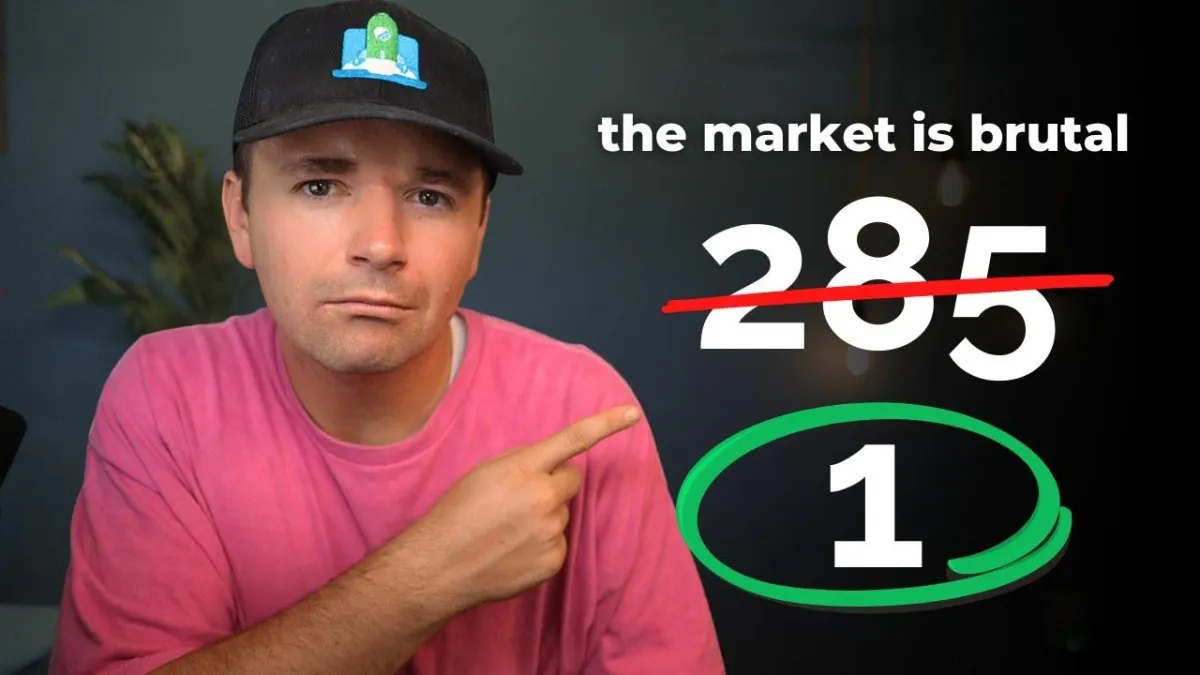
🔍 I Got 285 Data Analyst Applications. Here's Who I Hired.
285 people applied for one data analyst job. And ONLY 1 got hired.
I talked to the hiring manager who ran this brutal six-stage process. And she told me something that blew my mind:
“Honestly… probably 70% of the applicant pool could have been successful in this role.”
So if most people were qualified, why did 284 of them get rejected?
Let me walk you through exactly what happened at each stage and how to survive it. It may change how you apply for jobs forever.
Stage 1: Resume Review (285 → 12 people)
This is where 96% of applicants got eliminated.
Most companies auto-reject you before a human sees your resume. But this hiring manager actually read every single one, and still only picked 12.
So let me give you the brutal truth about what happened here:
1) Apply early. This job posting was only up for a week. If you apply late, you're fighting for attention with 200 other people. Early applicants get more eyeballs.
2) Fix your resume. At this stage, your resume is ALL they know about you. If it's not working, here's your checklist:
Is it ATS compliant?
Are you missing keywords?
Are you overqualified or underqualified?
That's it. That's what killed 273 people's chances.
Please, please, PLEASE don't take rejections so personally. You might just need a better resume.
Stage 2: Recruiter Screen (12 → 7)
This is where HR checks if you're a real human (yes, really) and if you can communicate clearly.
They're not testing your SQL here. They're just making sure:
You're not lying about your skills
You seem like a normal person who can work on a team
Your salary expectations match their budget
The location and work setup actually works for you
5 people got cut here. Seven moved forward.
Stage 3: Skill Assessment (7 → 7)
This is where they test your technical skills. For this role, it was SQL.
They asked two questions., and all seven candidates passed.
You can practice this stuff. There are tons of SQL practice platforms out there. The questions aren't designed to trick you. They just want to see if you can actually do the work.
Go practice.
One person dropped out to take another offer. So 6 people moved forward.
Stage 4: Hiring Manager Interview (6 → 4)
This is the first time the hiring manager meets you face to face.
They're asking questions like:
What's a cool project you've worked on?
What would you do differently in that project?
How do you use data in your personal life?
Two candidates got cut here. The hiring manager felt they had lower data visualization and data exploration skills than the remaining four.
You need a good portfolio project. It doesn't have to be huge. It doesn't have to use millions of rows. But it should be personal and tell a story.
If you can explain not just WHAT you did but WHY you did it, you'll stand out. Think out loud. Show your thought process. Be yourself.
Stage 5: Technical Team Interview (4 → 2)
This is like the hiring manager interview and the SQL assessment combined. The hiring manager and two senior analysts ask you more technical questions.
Explain a project step by step.
Why did you choose this instead of that?
They're not trying to trick you. They like you. They've invested a lot of time in you. They just want to see which of the four finalists is the best fit.
After this round, the team scored everyone based on:
Technical skills (SQL and Tableau)
Problem-solving ability
Communication clarity
Cultural fit
Two candidates scored slightly higher than the other two. Now it's down to first and second place.
Stage 6: The Final Decision (2 → 1)
Both finalists were great at SQL. Both could build awesome dashboards. Both communicated clearly. Both were fun to work with.
So how did the hiring manager decide?
Domain experience.
The winner had closer domain experience related to the company's industry. They understood the business. They knew the context. They could hit the ground running.
This is huge for career pivoters. What you studied in school matters. The job you're leaving matters. Your past experience could be the edge that wins you the job.
You’re Not a Bad Data Analyst - You’re Just Not Their Data Analyst
Most people think rejections mean they're not good enough.
But the truth is way simpler (and way less personal). You're not unqualified. You're just not the best fit for that one role at that one moment in time. Only on person wins for each job listing. Everyone else “fails”. But don’t take it as a failure, instead:
Apply early.
Match your resume to the job description.
Build a solid portfolio.
Practice SQL.
Lean into your background.
And most importantly? Stop taking rejections so personally.
You're closer than you think.
Keep going.
P.S. Want to build portfolio projects that actually get you hired? That's exactly what we do in my Data Analytics Accelerator. We build 8 projects together, including a custom capstone that's uniquely yours. If you want peers, a step-by-step guide, and constant support, consider joining our next cohort.


